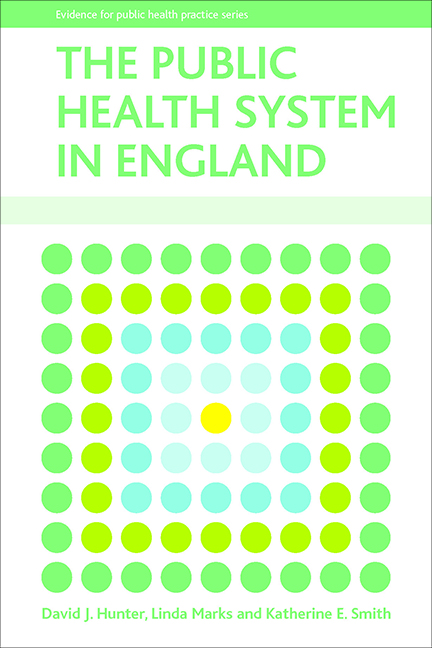Book contents
- Frontmatter
- Contents
- List of boxes and figures
- Acknowledgements
- List of acronyms
- About the authors
- one Introduction
- two Public health and a public health system
- three The evolution of the public health function in England (1): 1974–97
- four The evolution of the public health function in England (2): 1997–2009
- five Current issues in the public health system in England
- six Looking to the future
- Appendix: NHS reorganisation – 1975–2009
- References
- Index
six - Looking to the future
Published online by Cambridge University Press: 01 September 2022
- Frontmatter
- Contents
- List of boxes and figures
- Acknowledgements
- List of acronyms
- About the authors
- one Introduction
- two Public health and a public health system
- three The evolution of the public health function in England (1): 1974–97
- four The evolution of the public health function in England (2): 1997–2009
- five Current issues in the public health system in England
- six Looking to the future
- Appendix: NHS reorganisation – 1975–2009
- References
- Index
Summary
If we are to meet the daunting health challenges already known to exist as well as those that will, in all probability, arise in future (but which cannot yet be discerned), then those responsible for the health of the public need to raise their game and their sights well above what Wanless et al (2007: xxvi) call “piecemeal, often modest initiatives”.
What are the 21st-century health challenges confronting us? Collectively, as Marmot and Bell (2009), among others, have pointed out, we face several global problems in need of solutions. Two in particular stand out and most of the others are linked to them, in one way or another:
• the problem of climate change and environmental degradation and their consequences for, and impact on, health;
• growing inequalities within countries, combined with huge global inequities in social conditions and health.
A third challenge, which is not considered in detail here, concerns infectious diseases and pandemics. To some extent, these are driven by the other two challenges, particularly when it comes to their global diffusion. Although these three challenges can be regarded as separate and distinct, they are closely interconnected and no country, regardless of its wealth, will be immune from, or unaffected by, them. For example, the risk of pandemics arising from new strains of flu – the most recent example of which concerns swine flu, which originated in Mexico but spread rapidly to the US and to countries in Europe, including the UK – is increased as a result of greater mobility, global interdependence, international air travel and cheap flights. Even climate change may play a part in the transmission of infectious diseases.
Whether these factors will continue to grow and have such a profound effect on disease and its transmission will depend to some extent on what happens to our collective response to the environment, climate change and peak oil. It may be that the volume of international travel could be a victim of the depletion of fossil fuels. At the same time, the growing evidence of health inequalities within and between countries could well be a factor in the spread of infectious diseases. Furthermore, many of the people already living in difficult circumstances are those most at risk of experiencing poor health and are also likely to suffer more from the adverse effects of climate change and related problems.
- Type
- Chapter
- Information
- The Public Health System in England , pp. 149 - 160Publisher: Bristol University PressPrint publication year: 2010



